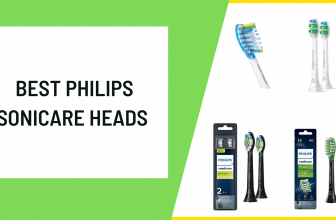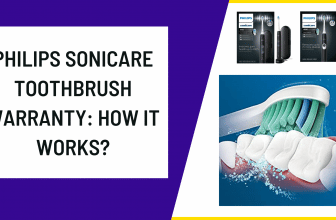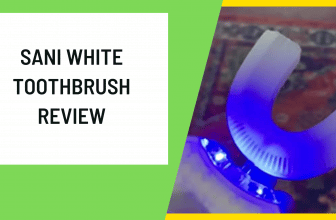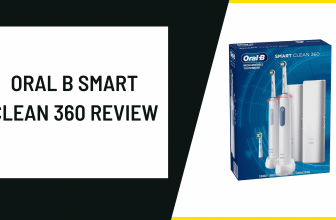
DIY ultrasonic cleaning has lately achieved popularity, and an increasing variety of items are selling for it. However, this does not imply it is a good idea. It is not essential for plaque removal, and you cannot use it to remove tartar instead of seeing the dentist.
Ultrasonic teeth cleaning you can use at home may seem appealing. You may be thinking this would spare you a trip to the dentist. But it’s all too wonderful to be true.
Our ultrasonic tooth cleaner review will explain why it is a bad idea to use it at home.

What Is An Ultrasonic Tooth Cleaner?
Ultrasonic teeth cleaners are available on the market for use at home. These are not the same as the scalers used in professional cleaning, and these are items that may be purchased both online and in stores.
These items promise to eliminate plaque, tartar, and stains using vibrations. They usually have a metal tip, although some have alternative tips, such as a rubber-based cleaner. Replaceable or rechargeable batteries power them.
How Does Ultrasonic Teeth Cleaning Work?
The system optimizes the usage of high-frequency sound waves. It has a scaled tip that vibrates at high frequencies and creates ultrasonic waves. Because of sonic vibration, the scaling point may get very hot.
As a result, a steady water supply is necessary to keep the scale tip cold. Meanwhile, the collision of sound waves with water results in the formation of bubbles. And it’s precisely these bubbles that remove bacteria, plaque, and tartar.
Certain chemicals indeed help in ultrasonic cleaning processes. But things change dramatically when an ultrasonic cleaner for teeth applies to one’s teeth. Toxic chemicals are not involved in this process. Using this method to clean your teeth is 100% safe, and there is no risk to your teeth. Do not think about car washing while you undergo this process; it is not the same.
This method is superior to scraping by hand since it produces cleaner results. It is because ultrasonic cleaning can get into cracks in your teeth that other procedures can’t. Additionally, it lessens the potential for enamel breakdown in the teeth.
There is a high risk of severe oral problems if you use a manual scraper. Again, the process is entirely risk-free when used to clean teeth. However, you need not worry unless you want to scrape manually.
Several dentists in the recent past have advocated for this method as the best way to clean teeth. In addition to its efficiency, it ensures patients will never again face significant complications. However, you should not use this method on kids younger than 12; patients must be 18 or older to undergo this procedure.
Pregnant women cannot have the treatment either because there are real risks involved in using ultrasonic cleaners on teeth. But before you go forward with the procedure, you should listen to what your dentist has to say.
Read More Articles
- 8+ Best Orthodontic Insurance Options
- What Are The Risks Of DIY Braces?
- 5 Best Travel Electric Toothbrush – 100% Recommended!
Why Should You Not Use Ultrasonic Tooth Cleaner At Home?
We may become more careful of our dental care and want to keep our teeth cleaner than usual. It would prompt us to seek do-it-yourself tools to remove plaque and grime. Some of the devices may perform very well at home; others may seem to perform brilliantly but may do more damage than good.
Dental scrapers are one of the instruments that dentists regularly use to remove plaque from the mouth. However, utilizing them at home may be hazardous. The following are some of the possible consequences of using a dental scaler at home:
Dental Scaling At Home Will Damage Your Teeth And Gums:
DIY dental scalers might cause gum injury. If misused, the sharp metal tip will cause gum damage. Because there is no water flow, the high vibration rate will irritate and harm the gums, leading to gum disease. When misused, ultrasonic scalers may also damage and harm the enamel surface.
Home ultrasonic tooth cleaners might cause harm to recent dental procedures. Scratching these surfaces increases their sensitivity to discoloration and plaque formation.
Using a high-vibration scaler without water might cause the tooth to burn. It will harm the tooth’s nerve in the pulp, and it may eventually be permanent and result in the tooth dying. The versions we tried did not vibrate rapidly enough to generate heat.
Such store-bought and home-use equipment are not sterile. You may accidentally introduce hazardous germs into your mouth and behind your gums, resulting in an illness.
You cannot adequately clean them at home. The germs on your teeth and gums will be transferred to the swabs when you use them. Cleaning products in the house will not completely clean the scaling tips’ surfaces.
False Promises From Manufacturers Of DIY Scalers:
Ultrasonic scalers for household use are worthless. These products make removing stains from teeth very tough, and it is unclear whether you will get the desired impact at home.
The producers claim that they are safe for everyone, including youngsters. Children as young as eight may use the product, as can “those with limited physical, sensory, or mental capacities.” We’d have to disagree. Most youngsters lack the skill to properly brush their teeth and utilize a sharp metal object in their mouth!
You will be throwing your money away if you buy these things. The additional polymers and resources create a needless environmental burden on an object that does not function.

Ultrasonic Cleaning At Home Vs. At Dentist:
Dentists and hygienists utilize ultrasonic scalers regularly. You can remove tartar and stains from the tooth’s surface and the area around the gums.
These at-home scalers are slower than professional scaling tips. Professional ultrasonic scalers vibrate faster than your ears can hear (ultrasonic), around 20,000 to 45,000 times every second. Professional sonic scalers vibrate from 3,000 to 8,000 times per second.
There is no water supply with these DIY scrapers, but on the other side, professional scrapers have a water supply. The water cools down the metal tip, and the water flow also aids the cleaning process under the gum level.

Professional ultrasonic scalers can potentially harm the teeth’s enamel surface and dental cleaner procedures. This also applies to homemade tartar removers.
Many of the issues outlined with these at-home scalers also apply to professional cleaning. The house scalers move quickly enough to cause damage but not quickly enough to be effective!
The most significant difference is dental experts understand how to use the instruments safely. They can also diagnose and repair any damage done, which is not feasible at home.
Conclusion: Why Is It a Bad Idea To Use An Ultrasonic Tooth Cleaner At Home?
There is no need to buy one of these do-it-yourself scrapers to remove plaque. Plaque does not adhere to your teeth and can be eliminated with brushing and interdental cleaning.
You won’t be able to eliminate tartar without seeing the dentist. The tartar’s connection to the tooth surface is too strong.
Instead of purchasing one of these products, use your time and effort to develop a decent dental hygiene practice.
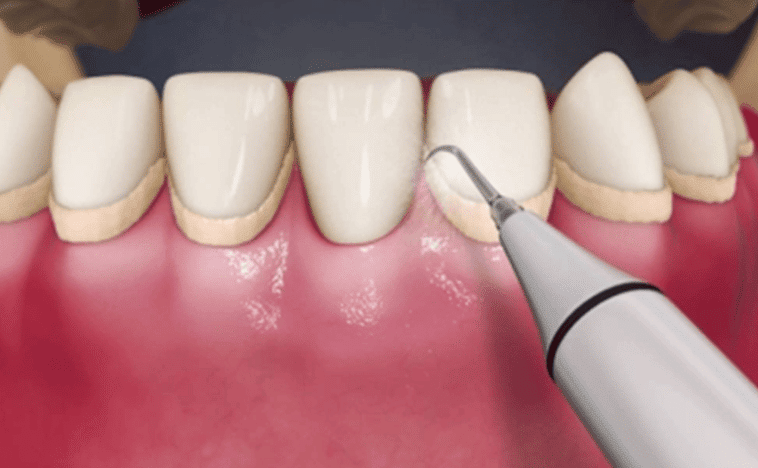
Plaque prevention will enhance your dental health. Plaque removal aids in the prevention of tartar and discoloration. Small dietary changes might also help to decrease stains.
We suggest you avoid meals that stain your teeth or brush after drinking staining beverages such as coffee.
The plaque removal capabilities of electric toothbrushes are superior. A decent toothbrush would be a good option than one of these scrapers.
Make an appointment with a dental specialist for sludge and stain removal. Moreover, a possible “scaling and polishing” procedure is conceivable.
Can ultrasonic cleaning damage teeth?
Yes, Ultrasonic cleaning can damage teeth if it’s misused. We recommend doing ultrasonic cleaning with the help of a dentist. However, extra measures should be taken if you choose to do it at home.
Do dentists recommend ultrasonic cleaners?
Most dentists recommend getting your ultrasonic cleaning done by a trained dental professional. Using Ultrasonic tooth cleaners at home may not be a bad idea.
Though, it can be used in between cleaning at home. However, we recommend visiting your dentist for a professional usage guide at home.
Do ultrasonic teeth cleaning hurt?
Ultrasonic cleaning does not hurt at all. The treatment is gentle and feels comfortable when performing teeth cleaning.
References:
https://youneedthisgadget.com/soniclean-the-new-ultrasonic-tooth-cleaner/
https://www.powerplanetonline.com/en/xiaomi-sunuo-t11-pro-ultrasonic-dental-cleaning-system



